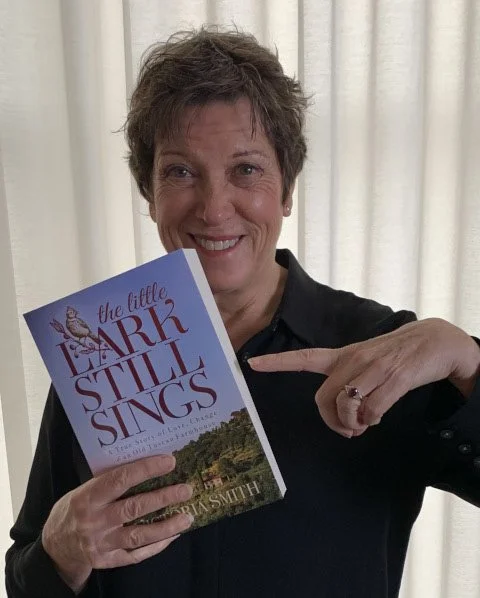Victoria Smith on Honesty and Ethics in Memoir
Lisa CliffordShare
A few years ago, a lovely American, Victoria Smith, joined the Art of Writing with her story about buying and renovating a home in Cortona, Italy. It was a story that had been done before, so I was concerned about how Victoria would approach her memoir, in a different and more engaging way than in Under the Tuscan Sun. I need not have worried. Victoria’s book The Little Lark Still Sings is a completely different ‘renovating in Italy’ memoir that bears no resemblance to Frances Mayes's storyline. In The Little Lark Still Sings, Victoria is courageous in her revelations of her truest deepest emotions. Hers is a moving story.
The personal challenge of being honest, ethical, and principled came up during last week’s Art of Writing memoir class here in Florence. The perfect person to discuss the issue, with real-life experience on the matter, was Victoria Smith.
Lisa: How important are principles when writing your own personal story?
Victoria: For me, insisting that my writing be accurate, honest, and honoring was essential. Especially after a 30-year career in marketing/advertising, it’s easy to embellish, to make something more glorious or horrific than it really is. I did a lot of backspacing when I’d get carried away. For my writing to ring true so readers could trust that it IS true, it had to BE true. With 600 pages of real-time journaling it was easy to be accurate, to get the facts right. Honesty is different; it takes courage to be introspective and vulnerable. Yet revealing my true self rather than my best self, invited readers to identify with me. To be honoring was the third leg of my stool. Too many foreign-life books make fun of locals, their ways and traditions, in order to look smart or clever. I wanted readers to love my characters as I do, to know the deeper and more beautiful aspect of each individual.
Lisa: Do you think memoirists are tempted to bend the truth to suit their storyline? There are situations when a memoir's chronological order can be changed to suit the pace and suspense of a story. However, sometimes writers fall into the trap of making things up to have a bigger impact. What are your thoughts on this? Were you tempted?
Victoria: Of course! However, whenever I became overly zealous, I forced myself to re-write the episode to stick to the facts and my true feelings; truth is actually more powerful than fabrication. Readers can tell. If I’d followed my creative whims without principles, I would have written a novel or book “based on a true story,” but it would not have been as good or effective. My principles actually became a chapter in the book where I promised my readers I'd be accurate, honest and honoring. I’ve received numerous reader comments on how surprising and important that chapter was to their mindset when they read the book.
Lisa: How vulnerable did you feel writing an honest memoir?
Victoria: When I started, I didn’t intend to publish, so I was pouring my heart into every line. It was my emotional outlet for the intimidation I felt in my new world and the deterioration of my marriage in the face of such enormous change and challenges. When I decided to publish, I had to swallow hard and make sure it was okay with Larry to be so exposed. I feared it would change how we were perceived and treated by family, colleagues, friends, and strangers. Yet what readers say (at least to us and in reviews), is that they admire us for our courage, especially Larry.
Lisa: How did your husband react, and how did you help him cope? What kind of conversations did you have about revealing such a personal aspect of your experience setting up in Italy?
Victoria: Since I had revealed a side of each of us that most people keep private, I expected him to ask me not to publish. But his response was so loving and humble that it gave me the perfect ending — the proof that our move to Italy had not only transformed our lives, it had transformed each of us and our marriage. He said, essentially and with tear-rimmed eyes, that it was a beautiful book, true to my principles. He apologized for making my life harder and said he wanted to be a better husband, a better friend.
When I asked him if the book was too private to publish, he paused, then said,
"We are human, deeply flawed, me more than you… If our struggles can help someone else with their struggles, someone we don’t even know, then of course you must publish.”
My already-high estimation of Larry grew immensely. Of all the comments I get from readers, my honesty and vulnerability are the qualities in the book that make them feel closer to me and inspire them in their own lives. Those three principles have given me the greatest joy in my experience of writing and publishing — because they are responsible for a writing style that has moved and changed my readers.
***
If you’d like to share any comments or thoughts, I’d be happy to hear from you. Email me directly at lisacliffordwriter@gmail.com.


